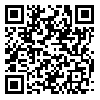BibTeX | RIS | EndNote | Medlars | ProCite | Reference Manager | RefWorks
Send citation to:
URL: http://sbrh.ssu.ac.ir/article-1-220-en.html
2- Department of Health, Shahrekord Branch, Islamic Azad University, Shahrekord, Iran ,
Background: Strategic knowledge management is widely recognized as a pivotal resource for the success of contemporary organizations. Self-management skills of managers are instrumental in fostering an organization’s growth and sustainability in the long run. The present study explores the relationship between strategic knowledge management and self-management and organizational development among managers in Social Security (Tamin-e Ejtemaei) Hospitals in the city of Isfahan.
Methods: This was a practical, descriptive, and survey-based research with a correlational design, classified as field study. This study was conducted in 2022 on 117 managers of Tamin-e Ejtemae’i hospitals (Dr. Ali Shariati Hospital and Dr. Gharazi Hospital) in the city of Isfahan. Strategic knowledge management was measured using Lopez-Nicholas and Mariano-Cardenas questionnaire, self-management was evaluated through SMSQ questionnaire devised by Houghton and Neck, and organizational development was assessed using the Lok and Crawford questionnaire. The collected data underwent analysis using SPSS 26 software and the statistical methods applied Spearman’s rank correlation test, Tukey’s test, homogeneity of variance, Kolmogorov-Smirnov test, regression analysis, T-test, and significance level was set at 0.05.
Results: A significant correlation was observed between strategic knowledge management and self-management (P-value = 0.027), strategic knowledge management and organizational development (P-value = 0.000), and between organizational development and self-management (P-value = 0.000). Regarding organizational development, the highest average score was associated with relationships (a score of 20.5172); for strategic knowledge management, explicit knowledge received the highest average score (a score of 21.2632), and concerning self-management, personal goal setting obtained the highest average score (a score of 20.1810).
Conclusion: Investing in strategic knowledge management, focusing on intellectual capacities, and increasing managers’ self-management improves performance and organizational development in hospitals.
Received: 2023/07/2 | Accepted: 2023/07/25 | Published: 2023/11/20
| Rights and permissions | |
 |
This work is licensed under a Creative Commons Attribution-NonCommercial 4.0 International License. |








